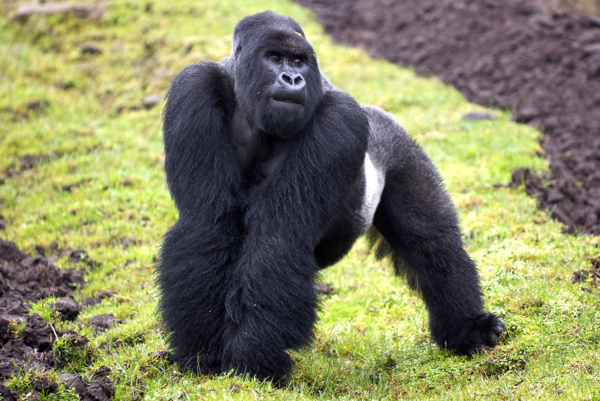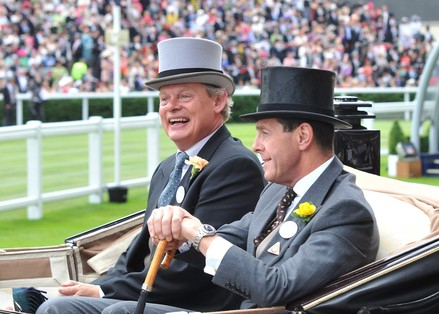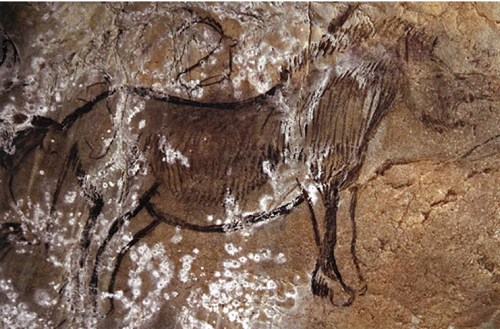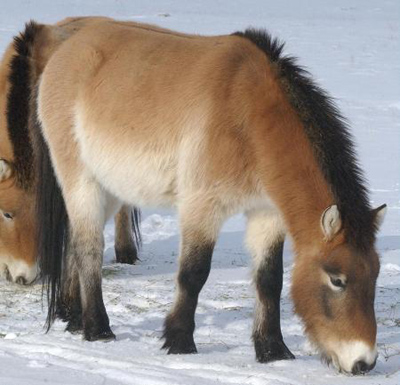Mountain Gorillas, BBC Two/ Horsepower with Martin Clunes, ITV1 | reviews, news & interviews
Mountain Gorillas, BBC Two/ Horsepower with Martin Clunes, ITV1
Mountain Gorillas, BBC Two/ Horsepower with Martin Clunes, ITV1
Fabulous camerawork turned into Gorilla EastEnders
People are lured to behave like animals for TV now - Big Brother, Celebrity Jungle, The X Factor - so it merely completes the idiotic equation to have animals insistently transfigured into little humans in wildlife TV. Or big, hairy humans in the case of mountain gorillas and Martin Clunes.
Horsepower with Martin Clunes (ITV1) should on paper have been dumber than BBC Two’s Mountain Gorillas, two one-hour series that launched last night in thickets of clichés. After all, he doesn’t want to make any claim to be an expert, just to be allowed to be a big soft dad with a horse (well, a dozen maybe) and a horsey wife and daughter. He's an actor, and wants us to love him for his cuteness, therefore it’s important not to be too clever and scare off the ratings. Clunes filled the job admirably, beginning in a gush of reverence that he never lost: “Is there any animal more graceful or powerful than the horse?”
Surely we already knew the answer, for precisely as Clunes (part one) began last night, Mountain Gorillas (part one) was ending, and if by then you didn’t think gorillas were not only more graceful and more powerful than horses, humans and the entire Bolshoi Ballet, it would not be for lack of adulatory effort by the Forces of Beeb.
A magnificent Bristol camera team went to the misty volcanoes and pellucid bamboo forests in the triple storm of conflicting interests that is the meeting point of Rwanda, Uganda and the Democratic Republic of Congo, where tribal war and human poverty offer staunch opposition to the peaceful existence of the only 700 Mountain Gorillas on Earth. They sought out the stronghold of the largest gorilla family in the world, 46-strong, an extended family that filled mountaintops, ruled by a huge silverback. But having got their incredible access to the kind and limitlessly patient scientists in the region and an undreamt-of intimacy with these weirdly attractive animals, was the producer Nigel Pope content to leave the cameras and scientists and animals to tell the story?
Indeed not. Someone - not a scientist, I’d bet, and almost certainly in cahoots with the PRs of three national tourist agencies - had written a script for Gorilla EastEnders. Patrick Stewart at his most actorish proclaimed how in this programme we would see the love of a father for his motherless child, the intimate lives of one of our closest relatives, a traumatised child caught up in violence between adults, a mother who abandoned her family, a teenaged boy who acts sullen and solitary and seems to be planning to leave home. And the editing duly poured the filmed material into the pre-set soap channels, with much reiteration and twanging of heartstrings on buzz words like "motherless" and "lonely".
 Reductive tosh like this ruins visually remarkable films that could do so much to enlighten us about the actual differences between animal and human behaviour. There was not the slightest need for gorilla or human intelligence to be so belittled. The story already had everything. It began with Dian Fossey, the pioneering gorilla expert who was murdered in her Rwandan base in 1985; since then the local town, Ruhengeri, has become the world’s gorilla centre, training zoologists in the “habituation” technique she pioneered, in which over a period of 10 or 12 years they familiarise the wild gorillas with their presence to enable even physical contact without disturbing the animals’ behaviour.
Reductive tosh like this ruins visually remarkable films that could do so much to enlighten us about the actual differences between animal and human behaviour. There was not the slightest need for gorilla or human intelligence to be so belittled. The story already had everything. It began with Dian Fossey, the pioneering gorilla expert who was murdered in her Rwandan base in 1985; since then the local town, Ruhengeri, has become the world’s gorilla centre, training zoologists in the “habituation” technique she pioneered, in which over a period of 10 or 12 years they familiarise the wild gorillas with their presence to enable even physical contact without disturbing the animals’ behaviour.
The patience and long-term motivation that this research training implies surely deserved some cursory mention, particularly in such an unstable economic region. And more, this very close encounter technique has produced more than just scientific guardian angels for every one of the 700 remaining gorillas; it has led to what Fossey long resisted, gorilla tourism in order to fund the research. We had a cursory glimpse of quite a lot of tourists mustering for a gorilla trek. Information, please. Education, please.
But the production team were into reality TV, not a nature documentary. Each gorilla had a name, a backstory, a life-crisis. The most plausible was about why the biggest silverback male was called Cantbe. It seems he was born to a gorilla everyone believed to be a male. Fossey exclaimed when told about the birth: “Can’t be!”
Wouldn't it have been more valuable to have had the scientists talking about their observations than the misleadingly anthropomorphic tourist spiel? For one thing, gorillas seem to attract sparky female scientists, and there’s also a new post-Fossey generation of young Rwandan zoologists. What of their deductions about what they watch? What of their family lives? What do they think of gorilla tourism? And weren’t the dangers they face in such a volatile region as interesting and germane as those of the gorillas?
 By comparison the Clunes film was pretty clunky, a strip of very expensive trips - the Daily Telegraph interview on Saturday speculated that this is part of ITV’s inducement to keep him in Doc Martin - pursuing his vapid and inessential questions about “the secret of our bond with these gentle giants” and “what horses still mean to us in the age of the jet”.
By comparison the Clunes film was pretty clunky, a strip of very expensive trips - the Daily Telegraph interview on Saturday speculated that this is part of ITV’s inducement to keep him in Doc Martin - pursuing his vapid and inessential questions about “the secret of our bond with these gentle giants” and “what horses still mean to us in the age of the jet”.
However, Clunes is a genial man, a devoted dad to a horsey daughter, and more into children’s gymkhanas these days than late-night bad behaviour. Six foot three himself, he rides a gigantic Shire horse, and one of the most charming episodes was when a horse-whisperer taught him to win his horse Chester’s undying respect and love by staring him down and walking off dismissively. Chester, a capricious buddy until then, meekly trotted after him, close as a shadow.
Like the gorilla team, Clunes flew everywhere but rather more obtrusively PR-fed. He jetted to Dubai to plug the luxurious new Meydan race track, helicoptered to the Mongolian steppes to track down the last wild horses on Earth, the Przewalski Horse, zipped over to southern France to descend deep into primitive caves to see 14,000-year-old wall paintings of horses extremely similar to Przewalskis, flew to Nevada to watch feral Mustangs galloping over snowy mountains, popped back to the Arab desert to admire bedouin pure Arab horses and rounded things off by attending a horse therapy bonding group in Arizona.
Below: horse painting in the Niaux Cave, southern France and Przewalski Horse in Mongolia:


This comes perilously close to vanity TV programme-making, were it not that Clunes is not quite the clot he needs to appear to keep the mass audience onside. He is deep down uneasy about racing: and wondered whether horses enjoy it. In Dubai he elicited the killer observation by a top horse trainer that horses are essentially driven by two natural instincts, fear and competitiveness. Clever trainers play on the “flight” instinct to make them run. The trainer said smilingly, why would a horse put himself through the pain barrier of a race - the jockey agitating on top, the crowd shouting, a whole bunch of other horses pushing past him. He runs because he thinks he’s in danger.
At last something that wasn’t all grinny and woofly and luvvie. Clunes became slightly more subdued when admiring the two phenomenal training talents of the bedouin with his Arab horses, and a gentle Frenchman on a beach with a pack of motley unbridled horses. He wondered if the thing about Chester wasn’t that he was a pampered pet who had no predators, loads of snogs, cuddles and tubs of oatmeal, and basically no job to do other than carry his weighty master about from time to time.
In part two a sterner Clunes is looking at jobs the horse does - eg when camels, donkeys and Eddie Stobart have taken over the burden side of a horse’s life, isn’t it time to find out whether horses are actually working hard enough to justify their feed in this day and age? Very Lib-Con. Chester should worry, unless he can find a way to turn the question back at his master.
- Watch Mountain Gorillas on BBC iPlayer
- Watch Horsepower with Martin Clunes again on ITV Player
Add comment
The future of Arts Journalism
You can stop theartsdesk.com closing!
We urgently need financing to survive. Our fundraising drive has thus far raised £49,000 but we need to reach £100,000 or we will be forced to close. Please contribute here: https://gofund.me/c3f6033d
And if you can forward this information to anyone who might assist, we’d be grateful.

Subscribe to theartsdesk.com
Thank you for continuing to read our work on theartsdesk.com. For unlimited access to every article in its entirety, including our archive of more than 15,000 pieces, we're asking for £5 per month or £40 per year. We feel it's a very good deal, and hope you do too.
To take a subscription now simply click here.
And if you're looking for that extra gift for a friend or family member, why not treat them to a theartsdesk.com gift subscription?
more TV
 Outrageous, U&Drama review - skilfully-executed depiction of the notorious Mitford sisters
A crack cast, clever script and smart direction serve this story well
Outrageous, U&Drama review - skilfully-executed depiction of the notorious Mitford sisters
A crack cast, clever script and smart direction serve this story well
 Prost, BBC 4 review - life and times of the driver they called 'The Professor'
Alain Prost liked being world champion so much he did it four times
Prost, BBC 4 review - life and times of the driver they called 'The Professor'
Alain Prost liked being world champion so much he did it four times
 The Buccaneers, Apple TV+, Season 2 review - American adventuresses run riot in Cornwall
Second helping of frothy Edith Wharton adaptation
The Buccaneers, Apple TV+, Season 2 review - American adventuresses run riot in Cornwall
Second helping of frothy Edith Wharton adaptation
 The Gold, Series 2, BBC One review - back on the trail of the Brink's-Mat bandits
Following the money to the Isle of Man, Spain and the Caribbean
The Gold, Series 2, BBC One review - back on the trail of the Brink's-Mat bandits
Following the money to the Isle of Man, Spain and the Caribbean
 Dept. Q, Netflix review - Danish crime thriller finds a new home in Edinburgh
Matthew Goode stars as antisocial detective Carl Morck
Dept. Q, Netflix review - Danish crime thriller finds a new home in Edinburgh
Matthew Goode stars as antisocial detective Carl Morck
 The Rise and Fall of Michelle Mone, BBC Two - boom and bust in the lingerie trade
Life in the fast lane with David Cameron's entrepreneurship tsar
The Rise and Fall of Michelle Mone, BBC Two - boom and bust in the lingerie trade
Life in the fast lane with David Cameron's entrepreneurship tsar
 Code of Silence, ITVX review - inventively presented reality of deaf people's experience
Rose Ayling-Ellis maps out her muffled world in a so-so heist caper
Code of Silence, ITVX review - inventively presented reality of deaf people's experience
Rose Ayling-Ellis maps out her muffled world in a so-so heist caper
 The Bombing of Pan Am 103, BBC One review - new dramatisation of the horrific Lockerbie terror attack
Six-part series focuses on the families and friends of the victims
The Bombing of Pan Am 103, BBC One review - new dramatisation of the horrific Lockerbie terror attack
Six-part series focuses on the families and friends of the victims
 theartsdesk Q&A: Zoë Telford on playing a stressed-out psychiatrist in ITV's 'Malpractice'
She nearly became a dancer, but now she's one of TV's most familiar faces
theartsdesk Q&A: Zoë Telford on playing a stressed-out psychiatrist in ITV's 'Malpractice'
She nearly became a dancer, but now she's one of TV's most familiar faces
 The Trunk, Netflix review - stylish, noir-ish Korean drama wrapped around a beguiling love story
Unusual psychological study of a stranger paid to save a toxic marriage
The Trunk, Netflix review - stylish, noir-ish Korean drama wrapped around a beguiling love story
Unusual psychological study of a stranger paid to save a toxic marriage
 Malpractice, ITV1, Series 2 review - fear and loathing in the psychiatric unit
Powerful return of Grace Ofori-Attah's scathing medical drama
Malpractice, ITV1, Series 2 review - fear and loathing in the psychiatric unit
Powerful return of Grace Ofori-Attah's scathing medical drama
 Fake, ITV1 review - be careful what you wish for
Australian drama probes the terrors of middle-aged matchmaking
Fake, ITV1 review - be careful what you wish for
Australian drama probes the terrors of middle-aged matchmaking

Comments
...
...
...
...
...